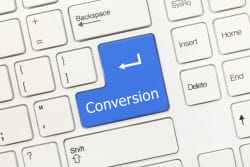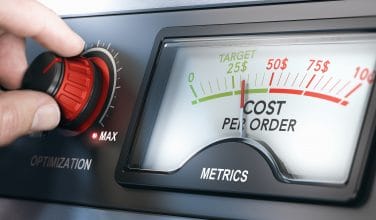Definition of a Conversion Rate
This article was published on August 3, 2011
Categorized in: Glossary
 The conversion rate of a website is the measurement of the success of a paid campaign. A conversion rate is measured by the number of potential visitors to a website performing the desired outcome. The outcome could be filling out a form, buying a product, membership registration, software downloads, calling your business, engaging with your online chat, or some other goal that the creator of the website has.
The conversion rate of a website is the measurement of the success of a paid campaign. A conversion rate is measured by the number of potential visitors to a website performing the desired outcome. The outcome could be filling out a form, buying a product, membership registration, software downloads, calling your business, engaging with your online chat, or some other goal that the creator of the website has.
How can you ensure a high conversion rate? There are specific steps you can take to improve your conversion rate over time. Attractive ads and websites that draw visitors in is a good place to start. Increase their interest and they are likely to click on ads and visit your website. Creating attractive offers that can’t be ignored is another way to get people interested. You also want to make sure that the ease of the process is up to snuff. When a visitor clicks on an ad or visits your website, the pages should be fast loading and navigation should not be complicated.
How do you calculate conversion rate in marketing? Conversion rates are calculated by taking the number of conversions and diving that number by the total number of ad interactions that can be tracked to a conversion during the same time period.
There are a few types of conversion rate that can be used to look at performance. These include:
- Overall conversion rate
- Page-level conversion rate
- Campaign conversion rate
- Marketing channel conversion rate
- Keyword conversion rate
- Individual ad conversion rate
What are the benefits of optimizing the conversion rate of your website? The greatest benefit is that you will see increased profits. Optimizing your conversion rate can be focused on improving the performance of your website as well as getting more people there. You can make sure there are no additional costs or increase in marketing that will require you to spend more of your budget. You might have some variable costs such as shipping products, but things such as marketing and employee salaries will stay roughly the same. Conversion rate optimization means that visitors to your website who become customers are having a good experience with your brand. They are seeking out what you have to offer and are happy to purchase from you. A customer’s experience with your brand will be translated into a better conversion rate.
By optimizing your website for better conversation rates, your website will begin to rank better in search results in Google and other search engines. This will help your conversion rate even more as you’ll be seen by more eyes. Part of optimising your website may be to focus on keywords that are getting more hits and may deserve more from the budget than keywords that don’t do as well.
Improving your conversion rate has a snowball effect. As results gain momentum as you continue to learn about your customers, rank higher in search engines, and make more sales, which increases your profits and grows your business.
Conversion Rate Definition Sources:
LIKE AND SHARE THIS ARTICLE:
About the Author: Brick Marketing President, Nick Stamoulis
 Nick Stamoulis is President of Brick Marketing and has over 25 years of digital marketing experience. He works directly with clients on strategy and implementation, helping solve complex mariketing, lead generation and sales challenges. Nick Stamoulis is a strategist and expert with Search Engine Optimization (SEO), AI Search or Generative Engine Optimization (GEO), content marketing, social media, pay per click advertising, and conversion improvement. Nick Stamoulis has worked with over 500 companies in many industries and also provides digital marketing consulting and training classes, helping companies improve performance and achieve desired outcomes.
Nick Stamoulis is President of Brick Marketing and has over 25 years of digital marketing experience. He works directly with clients on strategy and implementation, helping solve complex mariketing, lead generation and sales challenges. Nick Stamoulis is a strategist and expert with Search Engine Optimization (SEO), AI Search or Generative Engine Optimization (GEO), content marketing, social media, pay per click advertising, and conversion improvement. Nick Stamoulis has worked with over 500 companies in many industries and also provides digital marketing consulting and training classes, helping companies improve performance and achieve desired outcomes.




